Text
Nice post, I like how you connect everything with the idea of nature. Its interesting how Chihiro's parents possess a "false" connection to nature, as you put it, but still turn into pigs. It goes to show that even as animals ourselves, we can't appreciate other animals and their habitats.
Spirited Away
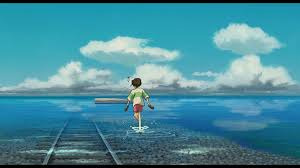
Studio Ghibli films, like this always give such a good sense of connection to the world. One can never go wrong by watching one of their many and great films. It makes sense that these films have preserved so long because they give people the same feelings. By watching spirited away, many scenes that bring pleasure and a sense of peacefulness is when Chihiro is interacting with the nature. The film starts off with her parents driving into and through the forest. While Chihiro initially found nature and interacting with it frightening, we see her develop throughout the film and gain a greater appreciation for it.
Chihiro even interacts with Haku who turns out to be a water spirit. This is just another sign of how important this film is as a pathway to nature and bridging the connection. Chihiro found out that Haku was the nature spirit by remembering her own childhood of being in the river and losing her shoe. Another way to see that the connection to nature has grown within Chihiro is by noticing in the beginning scenes she is holding on to some flowers. These flowers represent her connection to nature and as she desperately grasps onto them, she begins to make them wither faster. By the end, Chihiro no longer needs to maintain the connection through flowers anymore but can relive and reconnect through her memories of her time in the spirit town.
If Chihiro represents the connection to nature, then most of the other characters represent their connection to work life and industrialism. Everyone is forced to have some type of job unless they are a paying customer in the town. This moto is even a promise that Yubaba maintains, giving anyone a job who asks for it. The consumption of work life is repeatedly demonstrated, and it is only on limited occasions and by some characters that get to interact with nature. If Yubaba is the representative for Industrialism, Zeniba is the representative for nature. Zeniba lives far out from the industrial style bath house and stays in a modest home. She is surrounded by nature and invites those that come to her home. She even pushes for no face to stay and help her around the house upon Chihiro’s departures.
Chihiros parents represent a false and limited connection to nature, repeatedly demonstrating the satisfaction of their own interests. This starts off by them walking into what they thought was an amusement park and eventually eating food that was set without permission. Their strength of character is demonstrated here in comparison to Chihiro who refuses to go along with it even though her parents have begun to indulge. While we don’t see the parents until the end, when they get back, they complain to Chihiro for her delay and are upset about the car being covered with nature. This is likely a representation of how many see nature. Only using it for their benefit, as their satisfaction with nature ebbs and flows.
2 notes
·
View notes
Text
Spirited Away

Last blog post of all time :(
Glad we're finally discussing Studio Ghibli. It has been really interesting watching Ghibli carve out a space in youth culture over the past few years. Movies like Spirited Away are pretty unique in that they have almost escaped the Japanese entertainment niche interest and become fixtures in mainstream and popular culture, to the point of being shown regularly in movie theaters across the US. It's like the entertainment equivalent of sushi-- everyone young knows it and loves it, even if they're not particularly into Japan.
It's not hard to see why. Its super cliche to say, but this really is a gorgeous film. Regular TV anime is cool, but the low framerate has always been kinda ugly to me. THIS IS ART MAN. Crazy. Visual ASMR. All of that. Again, all things that have been said before, but I'm just glad I have something to rant about, since the last few films have been kinda underwhelming to me.
Anyway, I won't talk a ton about the plot, but I like how many times it evolves throughout the movie. Animated movies like this are unique because they don't seem locked into one plot mechanic or structure-- there are constantly new concepts and characters being introduced (the emetic dumpling, the bath tags, etc.) and its sick. Or maybe I'm just a little kid when it comes to movies and I need constant whimsy and magic. But hey, whats wrong with that?
On the cultural commentary side, Mauro was really insightful to point out the lost decade thing. Its fascinating how an economic crisis can tinge even media made for children. And indeed, as professor Smith pointed out, the idea as work as a solution to that crisis can be felt throughout the entire movie. Miyazaki seems to praise that buckle down attitude that emerged after the destruction of the war-- in his Japan, it is the decadence and consumption of the generations that followed that led Japan to burst its bubble of prosperity. But it is also interesting to think about how this promotion of work interacts with some of the film's environmental messages-- after all, isn't mindless pursuit of industry and growth what led to the environmental crisis that dirties the river spirit in the first place?
Anyway, not exactly dropping any hot takes here. Its a beautiful, fun movie and deserves its rep.
0 notes
Text
I agree, the sets here are beautifully constructed. I also mentioned in my blog post the picture you linked here; mount Fuji and the rising (setting?) sun against the American icon Quentin Tarantino-- in no other film do you see that.
Sukiyaki Western Django (2007) by Takashi Miike - Blog 22
Sukiyaki Western Django (2007) by Takashi Miike is a western and action film. It is played in the English language in a Western-styled Japan. The story revolves between two warring clans, the Heike and Genji, also known as the Reds and Whites. Amidst the turmoil, a lone traveling gunman meets both sides and rejects their requests for him to join them. Eventually he is taken in by Ruriko and later he meets Shizuka, a prostitute, mother of young Heihachi, wife of deceased Akira, and daughter in-law of Ruriko. After Shizuka warns the gunman of one of the Genji’s men revenge for him, he tells her to leave with his son. Unfortunately, Shizuka meets her end when she comes back to retrieve her “heart.” A plant growing with white and red colors. Then, it is revealed that Ruriko is Bloody Benten and she is seeking revenge for her son’s death. She also had Akira with Piringo, another talented gunman. In the end, the gunman has his final battle with Yoshitsune, leader of the Genji’s, and the Heike’s are killed by Ruriko. She is eventually killed by the sheriff.The gunman leaves town and he farewells Heihachi with a handful of gold. Heihachi in turn grows up into a gunslinger named Django. After watching the film, I enjoyed the action filled scenes and the camera work following the fights. I also felt like the story was dark. The death of Heihachi’s whole family was very sad and I believe the gunman had a similar experience as Heihachi and that is why there are flashbacks of a man and lady hung by a bridge. What I did not like was the things that Shizuka had to deal with after her husband’s death. She was raped and others attempted to, and she was constantly suffering from trauma. I felt bad for her as she sought revenge for her family by becoming a prostitute for the Genji and being killed for trying to save the plants Heihachi and she felt dearest to. Other than that, I was also intrigued by how creative the sets were made and the camera work where it shows plenty of headshots to show expressions on the faces of the actors. At the end, when they bring up what happens to Heihachi, I found it interesting how he decides to become a gunslinger in response to the trauma he has faced each time.

3 notes
·
View notes
Text
Sukiyaki Western Django
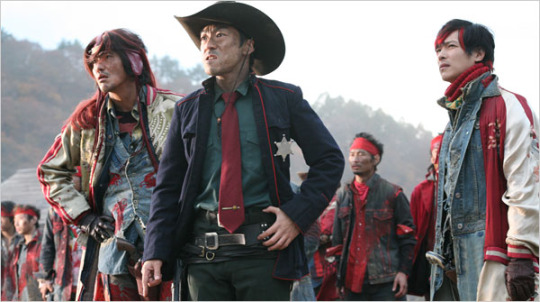
This one pretty decent. I liked it for a lot of the same reasons I loved Swallowtail Butterfly, but it did fall a little short of giving me stuff to chew on.
The concept of this movie is genius-- combining a classic Japanese text like the tale of the Heike with a quintessential American genre, and mixing in bits of random things like the war of the roses. Quentin Tarentino's cameo in the beginning of the movie and his continued role throughout is also priceless, and genuinely shocked me when I first saw it. Yuta-- especially in winter-- is shot beautifully, and the mix of Japanese and American aesthetics produces some visually striking scenes: western deserts against Ukiyo-e skylines, etc. I also love how the name of the film comes full circle, from Kurosawa's Yojimbo to the classic American western Django, and then this mix of both. Like Swallowtail Butterfly, the comedy also benefits from the goofy accented English.
But unlike Swallowtail Butterfly, I thought this film was a lot of style and not much substance. Whereas Swallowtail makes use of its mixed aesthetic and linguistic presentation to provide commentary on important social issues, this film seems to present its mixed aesthetic as a commentary in of itself. I found myself getting lost and zoning out during some of the violent scenes, and in the end felt like I didn't get much out of this one.
I did enjoy watching the film, and I hope we see more of these movies that aggressively blur cultural boundaries. But overall, I agree with one of the NYT critics on this one: "For a while the weird color scheme and the tongue-in-cheek evocation of various traditions of popular cinema are amusing. But long before the final blood bath arrives the movie has made its point, which is essentially that Mr. Miike has a lot of energy and an extensive collection of DVDs."
0 notes
Text
Sweet Bean
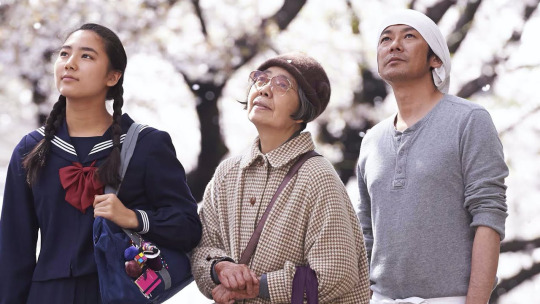
I thought this film was... lame. It did engage with leprosy, a social issue I have never heard of or engaged with before. But ultimately for me it was overly sentimental and just not that interesting.
I found myself kind of bored at the general progression of the plot. Tokue's arrival at Sentaro's restaurant, her sage-like knowledge of doriyaki and bean paste, her conversations with beans; all of it was just super predictable and stereotypical to me. The corny anime aesthetic is everywhere in this movie, from the cherry blossoms to the sailor suits, and even the plot progression. Things felt predictable enough that I didn't even feel that sad about Tokue's death.
Again, it was interesting to think about leprosy, and the discrimination people with infectious diseases can face. But I would rather see a film set entirely in that time period, when people were being shoved in sanitoriums. The idea of appreciating nature and the sensory world as the path to joy is also quite nice on its face, but again feels so much less interesting because of stereotypes around Japan and Japanese media.
When it comes to films and media, I guess I just like explorations of more serious topics. I don't need a movie to be super edgy or violent with everyone shooting each other all the time-- that extreme seriousness bothers me too, and is why I didn't like Hanabi. But I just cant get behind this sickly sweet, sentimental type of movie. It reminds me a lot of two Japanese novels: Yoko Ogawa's "The Housekeeper and the Professor" and Hiromi Kawakami's "Strange Weather in Tokyo". Like this film, both of these novels involve older main characters, talk a lot about the value of food, and find joy in the small moments. And like this film, I found them both super boring.
I will say the camera-work and cinematography was nice, but that's about it. :/
0 notes
Text
Yeah, I agree with some of your points. I wasn't quite as critical of the logical leaps-- to me the greatest sin here is just being boring, not inconsistent. But, like you, I value the bleakness and vibe of this film more than anything.
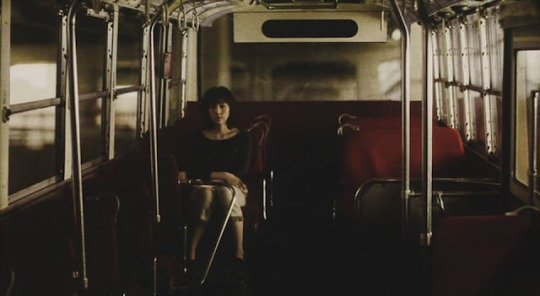
What an interesting premise that was terribly disappointing in execution. This is possibly going to be very critical, whoops.
The premise of Pulse is very fascinating. I love a good ghost story, or multi-dimensional story, especially when you tie in some aspects of tech-horror that this film has. And I do love a good apocalypse, especially a creeping one that you don't realize is happening until its too late. Those aspects of this film I appreciate. However, man what the hell.
So, clearly the conversation that this film is trying to tackle is about how the creation and ease of access of the internet is creating a worldwide epidemic of loneliness and isolation that is slowly killing the population. Not in any drastic way (though in some instances, yes, with the first death where he hangs himself) but in a looming, subtle sort of dissolving of sense of self. The people that get this... virus or whatever literally fade into surfaces and leave behind an imprint of the body. It acts like a computer virus--but it's really just highlighting what's already there. (In the case of Harue, who said she's always been alone. It's not a surprise she naturally turned to the internet/computer science to fill that void).
All of these aspects I genuinely enjoyed. The execution was dismal and confusing. I spent so much of the movie getting genuinely irritated by the logical leaps the people were making. Like, they would somehow immediately know things or suddenly forget important things, and it kept happening throughout the middle of the film that I was actually getting pissed off because it rapidly took me out of the story. Like the shit about the spirit realm being overwhelmed and having to come here, but then why are they making more spirits? Who aren't hanging around really all that much except for the few times someone hallucinates them? And then also it just wipes out everyone on the Earth? Stupid shit. Why did you bring up that random story if it has no relevance? Or is it related, and the message just got lost?
It had such a strong start, too, and even with the slow, creeping realization of what's going on, the end felt like the script writer got lost in his own sauce and forgot what story he was trying to tell. It became a weird jumbled mess that just repeatedly smashed you over the heat with a metal baseball bat about how terrible the internet is for society. Which like, totally valid, especially in 2001 but dude we get it. I got it the first 600 times you said it, I still get it now. I didn't get brain damage or alzheimer's in the last 20 minutes since you told me you were lonely.
Another positive I can give this film is the use of unease and discomfort of the use of shadows throughout this film. It was incredible. Possibly one of the best to do it, especially with all the people lurking (makes me think of Hereditary). I spent more time focusing on the background than the foreground, waiting to see what shadow was gonna move.
Another negative, this was so predictable. So, so, so predictable. Great idea. Mid execution.
Now, my theory is that the red used throughout is somehow the protector. Obviously, the red tape seals the door--but could it have been any tape? Probably, but they chose--and continued to choose--red. It is EVERYWHERE in this film. I think that's why our main girl survives. When shit starts really kicking off, she's always tied somehow to red, be it on her clothes or directly around her. Same with the loveable idiot Kawashima who wears his red hawaiian shirt until his dumbass changes to green and walks into that opened door.
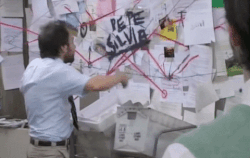
I love how bleak this movie is but I hate everything else.
4 notes
·
View notes
Text
Pulse

I'm not sure what I feel about this movie. For one thing, it scared me much more than Ring. But for another, I found the actual plot much less engaging.
The concept of this movie is definitely what fascinates me. Whereas ring seemed to address the broad presence of technology in the home, this film zeroed on the internet. And I do love the social commentary. When the first suicide happens in the beginning, I remember one character saying "He seemed so normal-- we just never knew" and I think that speaks to the breakdown of meaningful connections in the internet age. The ghosts seeking out people to share their loneliness perfectly fits that.
I also love the aesthetics here-- the black shadow on the walls and floors, reminiscent of the shadows left by those vaporized in the atomic bombings-- and the shock of some of the suicides we see throughout this movie (though I will say the bloodless gunshot suicide kind of took me out of it).
Most of all, I enjoyed the collapse of society as portrayed in this movie. It was so... eerily quiet and slow. I really liked the parallel with climate change mentioned in class, and I think its super relevant. Everything seems to be going well until its not, and planes are falling out of the sky. But even before that, at the beginning of the film, things seem not quite right. We don't see a lot of crowds: just urban cityscapes and quiet streets. That sparseness, and the dark grimy locations seen in the movie, give it a unique feeling of dread even before the ghosts become a thing.
Even though I was honestly bored at a lot of points in this movie, and it didn't do much for me plot-wise, it left me with a potent dread more lasting than any good story. And for that, it was impressive.
0 notes
Text
The Ring

I do enjoy horror movies a lot, but this movie didn't do it for me. I think it's kind of the same deal with Seven Samurai-- I'm just really used to more modern horror movies, and the lack of a ton of tension throughout didn't do it for me. I think the only things that really scare me are gore and jump scares, and there aren't enough here to really scare me.
However, I do like the concept and social commentary here-- the idea that if you look at this tape once, you're doomed. Its a nice allegory for the power of technology to draw you in, and draws on the early 2000s trend of chain letters and emails, especially considering Reiko's eventual solution to the problem of the tape-- that is, copying it.
I also like the use of the remote Izu peninsula for some of these scenes-- it provides a good break from the dull monotony of urban Tokyo, that was pointed out to be scary on its own. Its interesting to thing of how Japanese films and stories often portray a departure from Tokyo and urban life to the country, which is the source of mysterious and otherworldly things-- as in many of Murakami's novels, and the classic snow country. The cinematography is also pretty wicked at points, but the dull colors (again, especially in Tokyo) do make it sort of visually boring to me.
My favorite part of the film, and the part that did scare me, was Sadako's tape itself. It was a really fantastic use of analog horror, and the images used-- the people crawling up the beach, the guy standing with a cloth over his head-- was just perfect. Even though I didn't like this movie very much, I can appreciate its contribution to analogue horror, which has seen a pretty big revival recently on platforms like YouTube-- I saw someone mention the Mandela catalog in their blog post, and its a great reference.
0 notes
Text
Yeah I agree, I wasn't really scared watching this movie. The characters were safe too much of the time, and the slow build of Sadako's threat to the main characters didn't do much for me. I'm definitely spoiled by modern horror, though I do enjoy the social commentary here.
The Ring
The ring tells the thrilling story of one's memories and ill deeds from the past coming back to haunt not only them, but any who should come under the ire of the spirits wrath. I'm going to be honest, anything that I could come up with in terms of connections to Japanese society is pretty thin at best. People like horror because it gives them a thrill. Brings them out of their comfort zone and shocks them into a feeling of being alive even if that's through fear.
In comparison to modern day horror this film feels rather hollow. It attempts this slow build up to try and pull you into the fear, ticking down the days until your inevitable doom until you are hit with Sadako crawling out of the TV coming to... scare you to death? in retrospect that's kind of an odd way of killing people. In the movie we never see the entirety of Sadako's face, so it could be assumed that its her face being revealed that scares people to death, but for a horror film I feel like the cause of fear could have been developed stronger. The threat of torture, being eaten, used in weird and gross ways... there are a number of ways you can instill fear in someone, but the actual source of their fear is always really vague. The scenario where they are approached by Sadako crawling out of the TV is obviously enough to unsettle anyone, but what exactly is it that leads them to die? In the movie its suggested she has the power to stop peoples hearts, but again it seems to be from fear, at least when she is pursuing people in their homes.
I feel I should also continue by saying given that we watched it as a class it's hard to get absorbed into the horror element as much as one could have if they were alone in their house in the middle of the night. I feel like the setting in which you watch a movie, in conjunction with who you are watching the movie with makes a huge difference in its ability to inspire fear within you, but I feel like its psychological build-up left something to be desired, at least within a modern day audience. In modern days, there are several good examples of media that take good use of this slow creeping psychological terror. For example, the Amnesia games. It's constantly throwing uneasy situations at you and knowing that the monster could be there at any time is what brings the unease and this crippling feeling of "I don't want to continue". If the film wanted to create this true feeling of unease, I think it should have made the possibility of death available, and perhaps used the week timer as merely a sense of finality. You would die within 1 week rather than at the end of 1 week.
I've thrown a lot of shade at the movie, but I'm not really versed in pre 2000s horror. For its time it could be a masterpiece, I just don't have the context or knowledge to really elaborate on that. Overall, the movie was decent, I just felt like if it was remade today it could be a lot stronger in its approach.
2 notes
·
View notes
Text
Swallowtail Butterfly

Man I'm bumpin Yentown Band until I die. What an amazing film. I think this one may even top Go for me. I was actually supposed to be working on a Bio essay exam during our viewing session (sorry professor) but this movie just hooked me, and I had to watch the whole thing.
This movie combines some of my favorite things in a film-- heist antics, comedy, languages, and rock music. Each of these are filtered through the totally unique aesthetic of the dingy Yentown, which provides a setting like nothing we've seen so far. The characters themselves are incredibly charming, especially Fei Hong, who holds up a taxi then tries to find money.
Its a film that is full of energy, swinging rapidly from one shot to another and one genre to another. It was mentioned that one of the criticisms of this movie is its reliance on music video shot techniques, but I really enjoyed the camera-work. I think the frantic movement and wipe pans go perfectly with Yentown, and the pace of some of the scenes involved.
Ageha and Glico's parallel journey through the world of imposed identities, linked by the image of the butterfly, is really cool. Watching the former find her own identity and make money for her own reasons was inspiring, and my favorite part of the entire movie was when she ran her own counterfeit scheme with the slum kids. The club arc was also amazing, for no other reason than I enjoyed the music. (I've been listening to "Mama's Alright" on Spotify.) Goofy white guy that is fluent in Japanese is always a good bit. Speaking of languages, I guess it may sound condescending, but sometimes the accented English actually adds to the comedy. There is no reason that Rio Ranki saying "You fucking Kangaroo!" or "Oh no. I forgot my gun." should be so funny. But it is. And of course there's a deeper commentary here on immigration, Japanese society, and the new liberal economic order.
There are so many moments in this film that are priceless, and I could go on forever about how much I liked it. But in short, its a funny and interesting film that also tackles some really interesting issues in contemporary Japanese society. Banger
0 notes
Text
Yeah, I pretty much agree with this. I just didn't really have much sympathy for Nishi, and his adventures just seemed like violence for violence's sake. But yea, the stuff with his wife was cute and the score slaps
on Hana-bi - Takeshi Kitano (1997)
Initial Impressions
My first impressions when watching this film were of course regarding its soundtrack. I had known ahead of time that it was done by Joe Hisaishi, and his unique style was immediately noticeable from the first scene. That vibe did personally feel slightly out of place for a movie like this, but the music was kinda just really good so I didn't really mind that too much lol. I also thought the violence was a bit silly and the plot in general was kinda dumb, but it was still an enjoyable viewing experience overall regardless. Also, the sound effect mixing was kinda weird, but idk how much of that was because of my single earpod listening experience lol.
Further Critique
This was definitely one of those films I had a pretty hard time following and thus got like nothing out of it. It was clear pretty early on that some kind of incident happened prior to the events of the story which Nishi and the other characters have to process and deal with the consequences of, but despite this event eventually being sort of explained, it didn't really carry the kind of emotional weight/ significance you would expect (at least for me personally). I had a really hard time sympathizing with Nishi, partially because I was given basically no reason to aside from his wife's illness, and partially because half of this movie is just him doing crimes and brutally killing people all to help the people who's misfortunate situations he feels responsible for (I'm honestly still not entirely sure why?? Like, yeah he was there when his partners were killed, but it didn't really seem like his fault???). Like, I'm all for the whole atonement plot type of thing, but at least give me enough of a reason to care about the guy's motives before he just starts beating the shit out of people.
If I had to come up with one thing I enjoyed about this film, it was probably the dynamic between Nishi and his wife, especially seeing them just fooling around on that road trip. There's just something about Nishi's stoic but happy face next to his wife just constantly mesmerized by the simplest of things. I also liked how these scenes were intercut with cuts of Horibe's art, although I'm not entirely sure what the intentions were behind that. I also thought the directing and cinematography was pretty solid all around, although maybe a few too many of whatever you call those cuts that go from one action to another similar action accompanied by big noise. Those honestly kinda started to get annoying at a certain point lol.
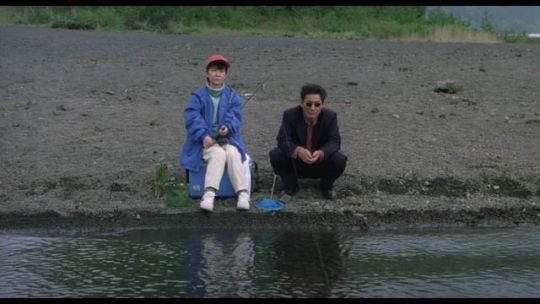
Overall, I'm not entirely sure where the praise for this film comes from, but the music was fantastic👍 5/10
2 notes
·
View notes
Text
Hanabi
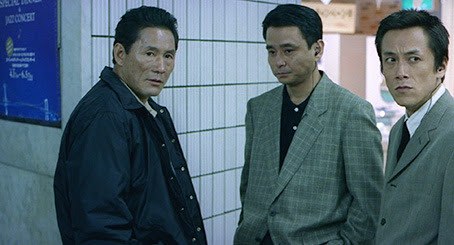
Honestly, I didn't like this film that much. It does have some good qualities-- I enjoy the aesthetic and the direction here, and I think the action scenes and shootouts are cool, plus its always fun to watch goofy Yakuza antics. My favorite part was the bank heist; I liked watching Nishi's preparations, and really funny to watch the junk yard guy and his "glue sniffing" assistant cheer him on ("Good luck on your bank heist!"). I also think Horibe was a really amazing character-- his journey of self discovery through art added a ton of color to this otherwise drab and depressing story of loss and death. There is also the amazing musical score by the goat Joe Hisaishi of studio ghibli fame.
Because all of that, I thought the film was decent, but after watching Swallowtail Butterfly and remembering what an amazing film is like, I sort of changed my mind. I was just bored by this one-- there wasn't enough dialogue, theme, or symbol to chew on. The shots were painfully long, and like... there's just no fun stuff here. That sounds pretty childish, but its true. I didn't really like any of the characters. Nishi was kind of just good at killing people and being brutal and had no other personality besides his guilt about his partners and the loss of his wife. Honestly, I don't even know what else to write about.
I think Hana-bi is a very self contained story. It basically concerns one man, his past, his family, and his violent adventures. No one besides Nishi and Horibe really have a backstory, or a motivation. They sort of all just go about their business. Maybe for some people that sort of understated movie that explores one topic very subtly and in great depth is cool, but to me it just feels very lonely, sad, and violent. What a bummer man. Also, killing yourself and your wife in front of a little girl is totally not cool, Nishi. smh
0 notes
Text
I'm a big politics guy and I liked your comments about in-groups and outgroups-- I think its pretty spot on. A lot of people have observed that our politics are more divisive and dogmatic than ever, and I think this movie's commentary on racial identity is really topical. I also hope more people learn to transcend their political identities.
Go - Yukisada
Go tells the story of a Japan-born Korean who runs into all sorts of turmoil with regard to his identity. In the beginning, we see the main character's (Sugihara's) father switch between his nationalities, giving very little weight to his national identity. He knows he lives in Japan, but chooses whatever nationality suits him best. Throughout the film, Sugihara's father, Hideyoshi (who played goro in tampopo), is kind of an asshole who plays to whatever works best for him at the moment. His choice form of punishment is beating down his son to the point of causing permanent physical changes to him (for example, Sugihara and the two teeth he lost due to his dad punching him in the face). Even when Hideyoshi recognizes he is wrong (when Sugihara is yelling at him after Hideyoshi's brother died), he still chooses to beat down on Sugihara and a full-on ring fight commences, announcer and everything.
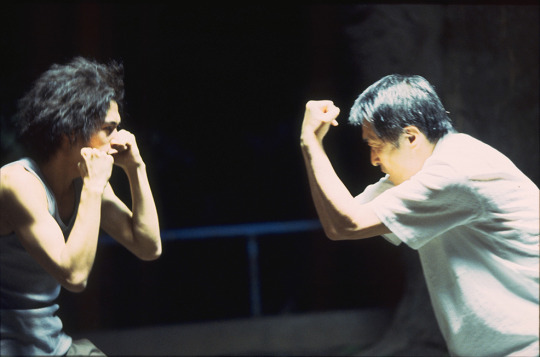
His old ways of disciplining Sugihara and his old ways of thinking about race and identity are a key factor that separate he and his son. Sugihara and his ideals are those of the new generation, and he continuously has to battle with those of the old, whether it be when boxing against his father, or when he argued with Sakurai over idea's implanted into her by her fathers old way of thinking.
Repeatedly, we are told by Sugihara that this movie is about his love story, but more realistically, it's about his fight against the restrictions of identity, and the fixed expectations that come with said identities. He fights to try and be seen as an individual rather than a classification, and only succeeds after being raked through the coals by both Sakurai and Hideyoshi. It takes the fight with Hideyoshi for him to clear his head and hear Sugihara's plight, while Sakurai has to seclude herself from Sugihara to have time to contemplate what she has been fed all of her life.
Personally, I feel like this movie not only appealed to audiences of the time, but still has a great deal of relevance today. Nowadays, it feels as if people are once again clinging to these ideas of identity and self-imposed segregation, and with this, people are becoming hostile towards those outside of their in-groups. It's extremely prevalent within politics, between democrats and republicans, where if you identify with one group, a hefty sect (albeit not all) of the other group will deem you as "the enemy" and as someone to convert. The movie helps to bring this idea that I am not simply the product of my parts. I am not simply a Korean and thus of tainted blood. I am an individual, just like everyone else, and should be seen as one.
6 notes
·
View notes
Text
Go

Definitely my favorite movie so far. I feel like I've said that about a ton of movies, but I really did love this movie. It was the only film this whole class that made me emotional and kept me engaged the whole time. That's no shade on the other movies, by the way-- I'm honestly just not a big film guy, and it takes a really good one to get me interested.
Like Owen and Shuuji, I've also seen IWGP, and this actor is great. Both that show and this movie focus on some cool ass 2000s kids that like to fight. But I liked this one even better than IWGP because it not only has some incredible style (the train running seen has to be one of the best movie openers I've seen) but also some incredible substance. It's also just such a cool and unique premise; I had no idea there was even a North Korean population in Japan at any time. The humor was great at every stage of the movie. I love Sakurai's whole bit with the shooting star and the snow; I guess the 2000s was when people became aware of corniness.
Speaking of corniness, one of my favorite aspects of this film was how Sakurai reacted to Sugihara's reveal. She's such a funny and sympathetic character that I almost expected her not to care-- but her response was much more realistic, and highlights something really interesting about racism and how it is passed down.
Sakurai "understands" on an intellectual level that Sugihara is not actually different from her, and there is nothing to be afraid of. And yet she is unable to prevent her physical revulsion at the thought of sex with him. Obviously no one is totally helpless against their racist upbringing or parents (and Sakurai is totally lame for her reaction) but this scene is still a cool exploration of the way someone can end up racist, even if they're not otherwise a hateful person. You could say them making up in the end is just so there can be a happy ending, but there's also the more hopeful message that even a racism so deep rooted that it causes physical (Also the conversation with the police officer is great)
Anyway, I could talk forever about why this film is great, but I won't waffle. It's an amazing movie and it really touched me.
1 note
·
View note
Text
Didn't think I would be reading "egg yolk orgasm" in my Japanese film class but yea, valid. I personally didn't like the comedy in this movie but I did like your note on how so much of the film focuses on barriers and etiquette people attempt to establish around food, its cool to think about
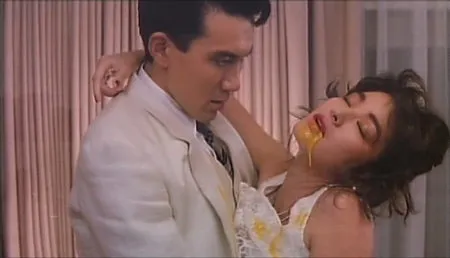
alright so i'm workin with exhaustion levels u've never seen b4 but i think i get this movie.
Firstly, the humor is pretty good throughout most of this film. I'm obsessed with the meta fourth wall breaking opening because that stuff is always done well. The goofy over-dramatized western movie aspects are hilarious and great, because they're so easy to mimic. Even the slapstick-esque (or like Chaplin style idk I'm TIRED OK) scene when they go visit Sensei and that one guy takes the kid into the kitchen to make omurice was pretty good even though I typically hate that style. This movie is so quirky weird and I vibe with that. Especially the little sound effects when they eat the noodles. The lil 'fwip' noises. It adds whimsy and who doesn't love whimsy.
Analysis wise, I think this movie's point is to show all the aspects of food and food culture? You have those that use it for greed, those that use it for pleasure (literally with the weird as hell sex scenes but like you go girl, ig) and so on. It's a very funny movie in many aspects but I don't think that takes away from the whole point that this movie celebrates food--specifically ramen. I like, too, that even the spaghetti scene we get where the etiquette teacher is trying to teach them all to eat like westerners/soundlessly, they go back to slurping the noodles and enjoying it how they would their food normally. It makes a point to show several times various people adding food restrictions to others (the elderly man and kid basically back to back) while immediately showing people sort of tempting them past those restrictions because food should be enjoyed however and whenever you want. (We're ignoring that the old man ate too fast and started choking).
Food is an art and that is shown in many, many different ways throughout. It should be explored, celebrated, and enjoyed in whatever way is personal to you. Good food unites people and allows for growth and connection. Food can also divide people because we all have our own tastes. It's oddly optimistic and sweet.
Could've done without the egg yolk orgasm and the turtle murder, though.
We don't kink shame, we kink why.
3 notes
·
View notes
Text
Midpopo

Nice to have another comedy, but honestly, I didn't enjoy this one. Family Game's weird, uncomfortable humor really worked for me, but this spaghetti western slapstick wasn't really for me. I guess I just like more realistic comedies instead of absurd stuff with guys named Pisken-- guess I'm on the hater team with Owen on this one. The comedy feels very cheesy, like the kind you would see in a sitcom.
Some parts that did strike me were the opening-- which was really great and mysterious-- and Tampopo's initial secret stealing antics. Overall I liked the strange cutaway gags (especially the final one) much more than Tampopo's story; I just didn't feel a connection with any of the characters. At least the cutaways had kind of a shock factor. Speaking of shock factor, seeing homeless people portrayed in a Japanese film was pretty shocking and cool-- im pretty sure that's the first time in this class. Not that films from any country tend to feature homeless people often, but I've always they are especially invisible in Japan.
Oh, speaking of the cutaway gag, the best one was the bit with the subordinate in the restaurant. It was already pretty funny but when the camera cut to the strawberry red faces of the superiors, I did actually laugh. Maybe the only time in the movie, but oh well.
I don't have many deep thoughts on this one (It was like 2am and I was kind of just eyes glazed over watching it) but clearly there's a big theme of food as a unifying force, and as a beautiful thing. It was an interesting contrast with The Family Game, in which food was used as a gross-out tool, and almost a symbol of decadence.
0 notes
Text
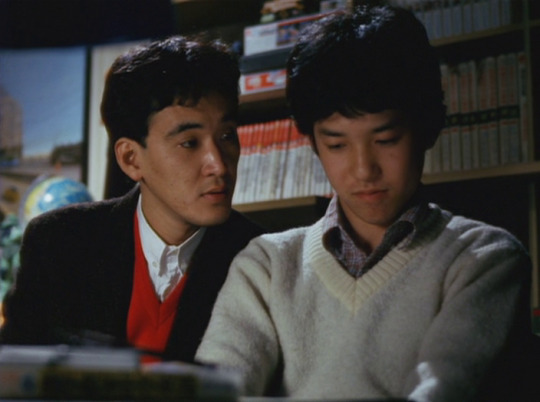
Nice to have a good comedy in the middle of two pretty dark films. I really enjoyed this film— all the jokes landed, and it was just so fun to watch, especially with the class. The odd sexual tension between Yoshimoto and Shigeyuki was a great bit, and I think Yoshimoto’s actor really sold him as this odd and enigmatic character. Some other good moments: the teacher throwing Shigeyuki and his classmate’s papers out the window (classic), Shigeyuki’s brother going to visit a girl he clearly likes and seeing another man there (I think?) the bit with Basho and “dusk” and of course, the final scene at the dinner table.
Speaking of that dinner table scene, I think it pretty much encapsulates the major theme of the movie. Yoshimoto is a symbol of Japan’s highly competitive education system based on class and university rank, and his culinary assault on the family during dinner (the only time when they are all together) demonstrates the degree to which families allowed this brutal system to bully and separate them. By the end of the film, Shigeyuki’s parents have totally accepted Yoshimoto slapping their kid around, and shooing them out of the room during their study sessions. Mrs. Numata even delegates the task of switching Shigeyuki’s school to Yoshimoto. By the end of the film, Yoshimoto has essentially become a parent himself, and Mr. and Mrs. Numata are totally okay with that, as long as it leads to results. But those results are called into question by the film— sure, Shigeyuki got into Seibu, but his brother’s grades are tanking. And by the credits, the whole family is quite literally exhausted.
3 notes
·
View notes